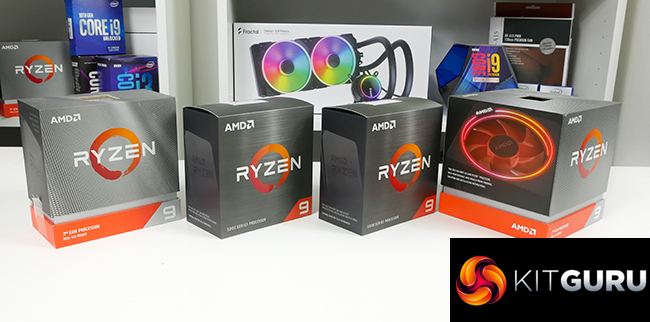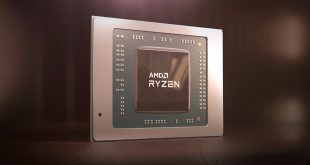The new Zen 3 AMD Ryzen 9 5900X 12-core processor unlocks a new tier of productivity performance at a price point of just over £500. The architectural improvements of Zen 3, in the form of the new 8-core, 32MB CCX and under-the-hood latency enhancements have really delivered in a variety of workloads, including gaming.
Further performance uplift versus its predecessors and competition is delivered via the higher operating clocks for Ryzen 5000, despite still using the same TSMC 7nm process node, albeit with silicon design tweaks from AMD.
A reasonable gaming performance summary would be that AMD is no longer left lagging behind Intel in terms of gaming performance. In our testing, the Core i9-10900K at 4.9GHz+ remains a stellar option for high refresh rate gaming, but AMD has made significant strides with Zen 3 to close the performance gap.
Technically, the Intel chip still looks a little faster based on our testing, but with victories trading back and forth between the 10900K and Zen 3, I do not think it would be unfair to highlight both options as strong, market-leading gaming processors. The Zen 3 gaming performance improvement over Zen 2 is sizable and welcomed.
That uptick in gaming performance makes the 12-core 5900X a more tempting proposition to potential Core i9 buyers at this circa-£500 mark. The 5900X and its two-dozen threads will also appeal to users who need a balance between productivity might and gaming performance without shelling out for the more expensive Ryzen 9 5950X 16-core.
Overclocking has been improved by a substantial margin in both the manual OC and PBO forms. PBO looks to be a good balance for this generation, even if the increase in all-core boost clocks for the 5900X was in the order of 100MHz. The fact that single-threaded boost behaviour still performed better than AMD's 4.8GHz specification rating is another success of the Precision Boost algorithms.
The 12-core Ryzen 9 5900X is positioned in a reasonably challenging segment of the market at around £510. The Core i9-10900K is more expensive at around £550 and AMD convincingly offers a better all-round solution in the 5900X. That’s an easy and obvious win for AMD.
Where the challenge really presents itself is from the £430-450 Ryzen 9 3900X or 3900XT and the Core i9-10850K. The Core i9-10850K in particular is basically just a 10-core 10900K with slightly lower factory clocks and a much lower price tag, making it stiff competition.
The £60-70 price increase versus the Zen 2 12-core nets buyers an undeniably better processor than the 3900X/XT but that level of fee does represent the cost of a good 500GB NVMe SSD or stepping up to 32GB of RAM instead of 16GB. Overall, though, I feel that the 5900X is worth the price increase over its Zen 2 predecessors simply because the performance justifies it, the gaming calibre is far superior, and the clock speeds are notably enhanced.
Versus the Core i9-10850K, performance for which we will estimate from our 10900K numbers, the 5900X is again a better solution but it is around £70-80 more expensive. Here, however, that £70 increase in CPU pricing is less of a downside for AMD’s 5900X than it was versus the Zen 2 12-core part. That’s because Zen 3 has a strong AM4 platform cost and feature benefit over the Intel competition.
Some of that £70 saving on the Core i9 could quickly be gobbled up in higher Z490 motherboard pricing versus competent B550 alternatives. And of course, the £70 extra for the Ryzen chip is an obvious choice for users already with a compatible AM4 motherboard.
Put simply, the slightly more expensive 5900X + motherboard combination is worth its cost increase over the Core i9-10850K + motherboard competition. AMD’s chip is often just as fast in gaming, it’s more efficient, and it offers far superior productivity performance in multi-threaded, lightly-thread, and single-threaded workloads.
Zen 3 represents a significant addition to AMD’s product stack and really hammers home the point that AMD is still, without question, the dominant force in the desktop CPU market. Given the productivity and gaming performance on offer from the £510 Ryzen 9 5900X, the Core i9-10900K becomes even more irrelevant at its higher price point. And even the competitive Core i9-10850K will struggle to show its worth versus the new Zen 3 chip thanks to AMD's improved gaming performance and excellent all-round productivity capacity.
The AMD Ryzen 9 5900X MSRP is $549 USD and £509.99 in the UK. The Ryzen 9 5900X is currently available at Overclockers UK HERE.
Discuss on our Facebook page HERE.
Pros:
- Excellent performance in a variety of workloads – multi-threaded productivity, lightly-threaded tasks, and high refresh rate gaming.
- Impressive boost clock speeds up to 4.9GHz – often above its 4.8GHz specification rating.
- Good performance gains from manual overclocking to 4.7GHz.
- Excellent thermal performance with off-the-shelf CPU coolers.
- Strong power efficiency.
- Drop-in upgrade for current 500-series AM4 owners.
- Superior value versus Intel Core i9 competition.
Cons:
- Price increase versus the Core i9-10850K gives Intel's processor some room to contest.
- More expensive than its predecessor but justified with higher performance.
- Some may be irritated by the lack of CPU cooler versus the Ryzen 9 3900X predecessor.
KitGuru says: Strong in multi-threaded, lightly threaded, and single-threaded tasks ranging from rendering to gaming, the AMD Ryzen 9 5900X is a superb option at a little over £500 and represents excellent balance in AMD's Zen 3 product stack.
Be sure to check out our sponsors store EKWB here
 KitGuru KitGuru.net – Tech News | Hardware News | Hardware Reviews | IOS | Mobile | Gaming | Graphics Cards
KitGuru KitGuru.net – Tech News | Hardware News | Hardware Reviews | IOS | Mobile | Gaming | Graphics Cards





